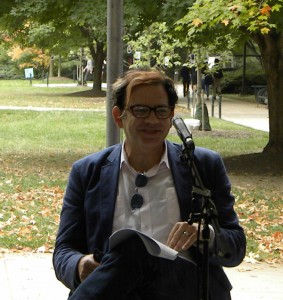 Shawn Westfall returned to the Better Said Than Done stage in September for Six Degrees of Kevin Bacon: true stories about or near Kevin Bacon. Watch his story to learn about the path that connects him, via Hawaii, to Kevin Bacon and then read his Video Extras interview for the story behind the story.
Shawn Westfall returned to the Better Said Than Done stage in September for Six Degrees of Kevin Bacon: true stories about or near Kevin Bacon. Watch his story to learn about the path that connects him, via Hawaii, to Kevin Bacon and then read his Video Extras interview for the story behind the story.
Shawn will next be appearing with Better Said Than Done tomorrow, October 24, at The Auld Shebeen in Fairfax, as the host of A Night at the Storytelling Improv, The Sequel. Tickets are available now or at the door.
With his wife Kathy Baird Westfall, Shawn launched the Unified Scene Theater, an improvisational and sketch comedy theater, in DC this summer, offering performances and improvisational comedy classes and workshops. He was the exclusive teacher of improvisational comedy at the DC Improv for more than 12 years. His classes (and the performances they’ve generated) have been featured in the pages of The Washington Post, The Washington Post Express, and Washingtonian magazine, as well on DC 101, WTOP Radio, Mix 107.3’s “The Jack Diamond Morning Show,” and The Food Network’s “Dinner: Impossible!” In addition, Shawn is the CEO and founder of Commedia Partners, which provides on-site corporate events that unleash the fun, power, and tools of improvisational comedy to help foment creativity, build camaraderie, enhance communication skills, create and cement teams, and allow organizations to re-envision themselves and their people.
[This show was not performed in our usual location, so please excuse the challenging lighting and sound in the video and press play to enjoy Shawn’s story.]Mary: What did you do to prepare to tell this story?
Shawn: It’s funny. I don’t memorize the story per se. As an actor, I was taught to “memorize the beats” of a play, and by “beat” we usually mean “unit of action as defined by a either a momentary or thematic want or need.” Beats can be anything from “I’m thirsty and I want a drink of water” as a way of clarifying the action taken during a series of lines, or “I really want my father to accept me for who I am” as a thematic overall want of a character in a play or structure. Having that training helped me think the same way when it comes to stories. Some storytellers think in terms of “funny lines” that they want to make sure get into their story and are heard by an audience, and that can sometimes trip them up: if they forget their line, they sometimes can forget their place in the story entirely. I’ve found that memorizing instead something like “I want the audience to know how embarrassed I was at this point,” or “I want them to feel my frustration here” certainly helps me when it comes to preparing.
Mary: Were there any details you had to cut – either for time or they just didn’t fit the narrative – that you’d like to share?
Shawn: In my story, I mention how welcoming and extraordinarily nice the Olsen Twins were to me when I acted with them in that movie. And to be sure, they were nice, as nice as two 11-year-olds would know how to be to a paunchy, 30-plus-year-old man acting with them in a children’s movie. But what I also wanted to share in the story, but didn’t really have time (and I was already pushing it, time-wise), was how insufferable many of the adults who were attached to the production were. People who were proud to claim that they were attached or in the employ of two 11-year-olds. “I’m Ashley’s aesthetician,” or “I’m Mary-Kate’s make-up artist,” they would say to anyone on the set, in a weirdly haughty manner, as if trying to let you know your place in the pecking order on set, as well as theirs. At first I found it a little annoying, and then I found it endlessly humorous in a perverse way. I mean, had I ever been in a similar position, there’s no way I could have, with a straight face, told anyone, particularly a family member, that I had somehow “made it” in Hollywood by proudly proclaiming that I was, say, Joe Jonas’ dietician.
Mary: What was the first play you were in, when, and what was your part? For me, it was Hermia in the Shake Hands with Shakespeare version of A Midsummer Night’s Dream in the 5th grade.
Shawn: Midsummer, eh? And in fifth grade? I was obviously going to the wrong schools.
The first play I was in took place in high school, my freshman year. I was dating a girl who was a sophomore, and she was involved in the theater, was in all the high school productions. I certainly didn’t think theater was “cool” at all (despite my youthful ignorance of what was actually “cool,” and despite my own lack of awareness regarding how “cool” I actually was), and it certainly wasn’t on the list of things I was planning to try as a new high school student. But she convinced me to audition, pointing out that going to rehearsals in a large cavernous theater with plenty of unsupervised alone time might be beneficial to our, er, relationship. So I auditioned for the musical, Finian’s Rainbow, with that E. Y. Harburg score that I’ve now come to realize is just plain gorgeous at every turn. With no experience whatsoever, I tried out. And: not only did I get a part, she didn’t (consigned, sadly, to the chorus). We, er, broke up soon after. So while I lost a girlfriend, I gained a love for the theater that’s never left me.
Mary: On the subject of Shakespeare, I’ve read on Facebook that you think it’s important that Shakespeare is taught as a play rather than something that is simply read by students on their own. Do you think this is important for other plays as well, or especially those that aren’t contemporary, where the language can be a stumbling block?
Shawn: Well, what I really prefer is that Shakespeare isn’t necessarily taught as a play, as something that’s handed to you and that you read, but is instead experienced as a play, since, well, that’s what he wrote. I think this is important because, let’s face it, the language of the play can provide challenges for even adults, let alone students. Don’t get me wrong: I know there are phrases and uses I and others are currently peppering our everyday speech with that Shakespeare first coined out of whole cloth (and even “whole cloth” might be one of them), and listing them would require all the space of this blog. And his work in particular does contain arcane usages and references that, on paper, require a gloss. But what I am suggesting is that his lengthy speeches aren’t pieces of poetry in the strictest sense of the word, nor are they “texts” in which we should root around, or analyze, or “close read” for even more evidence of the thematic ideas a particular play is exploring. They are lines of dialogue spoken by characters who resemble some of the most finely drawn nuanced examples of actual human behavior ever placed inside a narrative (Eliot said that “Shakespeare and Dante divide the world between them; there is no other” — meaning that, between them, they provide a comprehensive catalogue of all human behavior and the motivations informing them). That said, why not actually go watch them behave, and have audiences, particularly young audiences, come to understand them not just by what they say, but by what they do and say? Young people have finely tuned antennae for hypocrisy; they’re pretty good at spotting the tremendous gulf that exists between what people say, and what they actually do. Shakespeare’s plays are rife with examples of this stuff, and no one would enjoy it more, I think, than younger audiences. Yet, what do we do? Throw texts at them that we not only expect them to read, but understand, despite the obscurities in them, obscurities that scholars are still arguing about. It’s criminal what we do to Shakespeare, and we should stop.
Mary: Who is your favorite playwright or screenwriter?
Shawn: They are kind of one and the same: Martin McDonagh, Irish playwright, author of The Pillowman, The Lieutenant of Inishmoore, The Cripple of Inishman, and A Behanding in Spokane, as well as the screenwriter and director of In Bruges. What I love about him is how wonderfully he unites the perverse and the ironic, the grotesque and the sublime, the violent and the profane with the comedic. His plays are, literally, violent bloody messes: Act II of The Lieutenant of Inishmoore features a stage and a set that’s completely covered in blood, and finds the actors/characters in them trying to behave in this context as they slip around in all that gore; A Behanding in Spokane features a character who carries around a duffel bag full of severed hands, and yes, per Chekhov’s old theatrical rule about a gun being brought out in Act I (“It had better have been fired by Act III”), it spills out on to the stage; both of those plays are two of the funniest plays I’ve ever seen. And, to add to my Shakespeare comments above, it actually places McDonagh squarely in the grand theatrical tradition ushered in by Shakespeare in that’s its pure spectacle. People often forget that Shakespeare’s plays are incredibly violent, and, what’s more, all the violence takes place on stage (as opposed to Greek tragedy, when the more violent parts take place off it). In King Lear, Gloucester’s eyes are gouged out on stage, not off. I know it’s actually hard for people to contextualize, but Shakespeare was actually the Michael Bay of his generation: sword fights, battles, sexual puns (really bawdy ones, too), bodies littering the stage. Why was he bloody? Because audiences paid for it. In droves. He retired to Stratford a very wealthy man.
Mary: How long did you live in Hawaii? Did you ever enjoy the beaches of Hawaii while you lived there? What was your retail job while in Hawaii?
Shawn: I lived in Hawaii for about 3 years. I didn’t like it. One, because, as the story makes clear, people in Hawaii are really, really in to the outdoors, and I at the time was not because I was extraordinarily out of shape and not at all active. I’m sure I would enjoy Hawaii more now. Another thing I noticed was that it was easy to get intellectually lazy out there. At the time I had ambitions of being a writer (and still do), but, gosh, it does become awfully hard to work on your pretentious, ambitiously lengthy tome on the plight of modern man and the futility of his actions when you look out your window and it’s such a damned nice day. And there are no seasons. One gorgeous day just kind of melts into another gorgeous day, and you become aware of just how much time you’ve wasted just hanging around and enjoying all these gorgeous days. I’ve since discovered that my sensibilities are definitely East Coast, despite my Midwestern upbringing. I tried to make up for it by working in a bookstore. I worked in a Borders. I loved it. Love books, love literary culture, and loved being around people who loved books and the accompanying culture. And not only that, I was good at working in a bookstore, an exceptional “hand-seller,” as we called it. When I placed books in peoples’ hands and recommended them, they usually walked out with them. Had I worked on commission, I would have been driving a Jaguar to work.
 Mary: Shawn has a Bacon number of 3. He worked with Mary-Kate and Ashley Olsen in their video series The Adventures of Mary-Kate and Ashley, who were in It Takes Two with Steve Guttenberg, who was in Diner with Kevin Bacon.
Mary: Shawn has a Bacon number of 3. He worked with Mary-Kate and Ashley Olsen in their video series The Adventures of Mary-Kate and Ashley, who were in It Takes Two with Steve Guttenberg, who was in Diner with Kevin Bacon.

